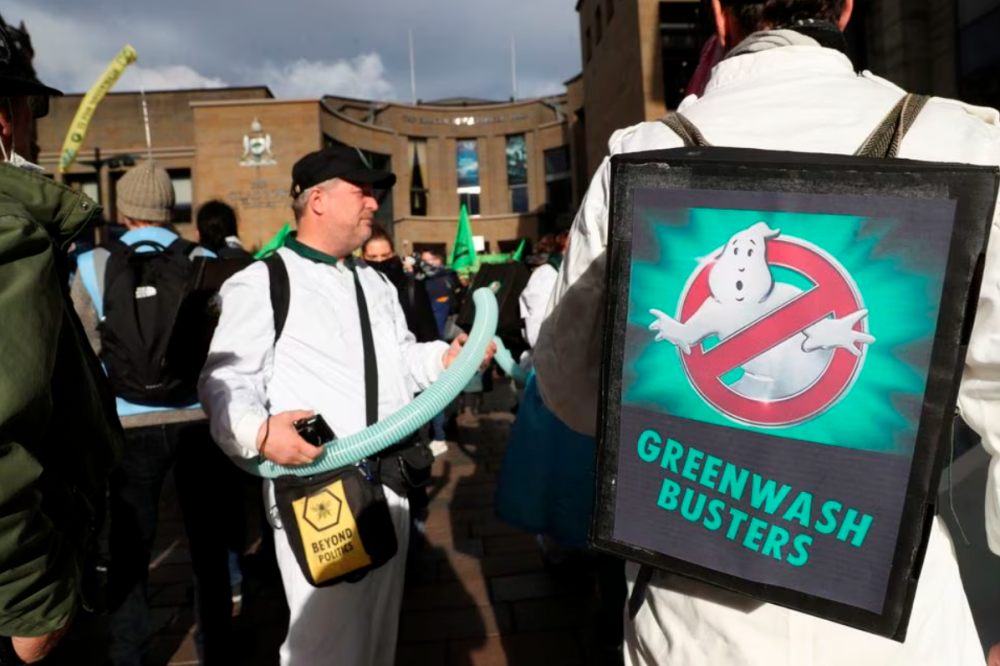YOU know what a whitewash is. That is when the truth is swept under the carpet. Here is an example, Barbie Dolls. For decades, Barbie has been an icon of girlhood.
It is arguably the world’s most popular doll.
It was almost aggressively a white-skinned, blue-eyed, blonde.
It was sculpted to European-descended perfection. So was her companion, Ken.
There are now Black Barbie and other dolls for non-white children and for white children who want them.
Yet, the hallowed status of the White Barbie in our culture as well as, until recently, the overabundance of white protagonists in fairy tales and children’s stories, from Cinderella to Goldilocks and the Three Bears, has created a “whitewashed” childhood world. That is an example of a whitewash.
Now, a greenwash means quite a different thing.
Greenwashing is a harmful and deceitful way of advertising that a company is greener than it is.
The range of greenwashing can be as subtle as misleading packaging to fossil fuel companies claiming to be eco-champions.
Either way, we need to call it out when greenwashing happens so the companies that practise it are forced to account for their actions.
Volkswagen
A classic example of greenwashing happened when Volkswagen admitted to cheating on emissions tests.
It did this by fitting its vehicles with a defeat device software.
Whenever the vehicle was being tested by regulators for emissions, Volkswagen’s software could detect the test and then – wait for it – alter the vehicle’s performance to reduce the emissions level.
While all this was going on, Volkswagen portrayed to the public that its vehicles had eco-friendly features.
In fact, Volkswagen’s engines were emitting up to 40 times the allowed limit for nitrogen oxide pollutants. That is one example of greenwashing.
The fuel giant, BP
BP changed its name to Beyond Petroleum. It announced publicly that it had added solar panels to its gas stations.
In December 2019, an environmental group called ClientEarth lodged a complaint against BP.
These ad campaigns, called BP’s global “Keep Advancing” and “Possibilities Everywhere”, focused on BP’s low-carbon energy products.
In reality, over 96% of its annual expenditure had been on oil and gas.
So, ClientEarth accused BP of misleading the public with its advertisements.
The complaint was lodged with the UK’s National Contact Point for the Organisation for Economic Co-operation and Development (OECD) Guidelines for Multinational Enterprises or National Culture Policy (NCP).
NCP is a body that sits within the UK’s Department for International Trade.
OECD Guidelines are recommendations addressed by governments to multinational enterprises operating in or from adhering countries.
The guidelines encourage global companies to incorporate social, human rights and environmental considerations into the way they do business.
A precedent against greenwashing
In its decision, NCP found that ClientEarth had a legitimate interest in the complaint and that the complaint was material and substantiated.
In February 2020, BP withdrew its advertisements.
BP’s CEO Bernard Looney promised an end to corporate reputation advertising.
BP committed to redirecting its advertising resources towards advocating for progressive climate policies. It had withdrawn its ad campaign.
In June 2020, the NCP stated that it would not proceed further with the complaint.
ClientEarth lawyer Sophie Marjanac said, “We took issue with BP giving the impression that it’s racing to renewables, that its gas is cleaner and that it is part of the climate solution when the vast majority of its spend is still on fossil fuels.
“Today’s decision sets a precedent for people to use the OECD guidelines to hold companies to account for their greenwashing on the basis of consumer interests, including in their advertising.
“Fossil fuel companies using advertising to mislead the public over their climate impact have been put on notice.
“Ideally, all fossil fuel advertising should be banned, unless it comes with a tobacco-style health warning about the risks of climate change, including the dangers of continuing to extract and burn fossil fuels.
“The public should not be misled and fossil fuel companies must be accountable for the damage they do.”
Alarming escalation
In recent years, greenwashing has escalated alarmingly.
This is because of the growing consumer demand for green products.
So, businesses use all manner of underhanded tactics.
So, a greenwash occurs when a company says it uses sustainable practices but does not do so. It is all a public relations tactic.
Businesses go out and hire public relations professionals, instead of hiring sustainability experts.
PR experts are asked to improve the business’s image as a sustainability practitioner.
Some trees are planted in a blaze of publicity or some river clearing is done over one weekend.
In reality, the boards do nothing meaningful other than spouting the inanities scripted by their PR moguls.
They do not adopt meaningful long-term sustainability policies and none are put into practice.
The training given to the management is largely ignored.
The word sustainability rears its silvery head in websites and annual reports. That is all.
Nothing more is done. That is a greenwash. It is lip service in its true sense.
If you are a business sincerely concerned with sustainability, this is what you should do
With the buzz on greenwashing, companies need to be careful of presenting baseless claims of being environmentally friendly.
It only takes one complaint to instigate an investigation against the claims your business makes on social media.
Once your business is exposed, a drop in profits is only the beginning.
The worst is complaints of lower consumer confidence.
A reputation lost is hard to regain. Consumers do not forget or forgive easily.
The question is, how long will you ignore sustainability practices before your customers refuse to have anything to do with your products?
GK Ganesan is an advocate and solicitor, and an international commercial arbitrator. He is a constitutionalist, author and litterateur. Comments: letters@thesundaily.com









